Three weeks ago I went swimming to the cut-off meander of the Danube in Greifenstein, a village close to Vienna. It’s a very idyllic place, and I usually prefer going there to paying an entrance fee for one of the overcrowded outdoor pools in the city. You go to one of these pools on a Sunday, and you apprehend on a very physical level that overpopulation is real and humankind is by no means at risk of extinction. The older I get, the less tolerance I have for overcrowded places. Everyone is in each other’s space all the time, which makes people aggressive. 30 years from now I see myself living as a recluse on an island with noone but my best friends and selected family. Living the senior life.
But back to story: So I was in Greifenstein, lying on the grass at the water, watching the sky, when it suddenly struck me, how many planes crossed my head within only 10 minutes. I honestly couldn’t believe it. I mean, of course, I kind of knew that air traffic is constantly rising, but I had no idea how this effectively panned out in real life. And this was the first time that it shot to my conscious awareness: Houston, we do have a problem!
Honestly, it made me nervous to observe at which frequency the planes appeared from each direction, leaving their white trace of exhaust gases on the sky. At this point I could literally see the polar caps melt at one-second-intervals in front of my mind’s eye. Flying and its devastating impact on our environment was all I could think about that afternoon.
The next day I downloaded the “Flugzeuge Live“ app – a tracking app, which shows you in real-time the planes that are currently up in the air. If you slightly zoom out, Europe vanishes underneath a wild jungle of blue planes. You can barely see it anymore, it’s surreal:
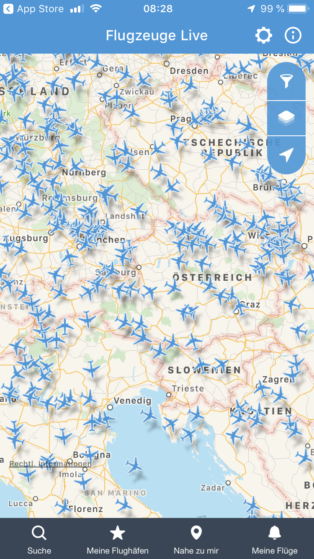
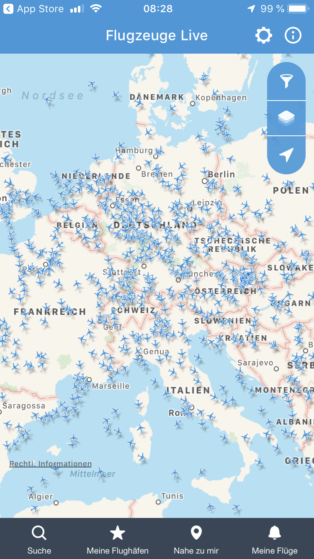
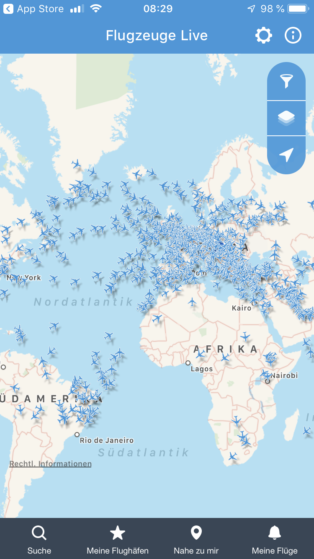
(Please also note the difference in flight density when comparing Africa and Europe…)
To say I was shocked at this sight is an optimistic understatement. I was bewildered! I made two instagram stories featuring the app to let my friends and followers also gain a bit of an insight into a topic we all want to close our eyes to. Because hey, what you don’t see, doesn’t exist, right? It’s a bit like playing hide-and-seek among 3-year-olds.
I received a couple of shocked responses, but the way it usually works is – you feel a short sensation of shock and then proceed with business as usual. We’ve just seen too many pictures of starving children, bomb-damaged war zones, Donald Trump headlines and plastic-polluted oceans to really care about anything anymore. All we care about is ourselves, our very own well-being and everything that short-term serves us in our hedonistic pleasure hunt.
Traveling to foreign places can provide you with the dopamine you’re looking for. And also with a good kick of adrenaline und serotonin. In short: Traveling can make you happy. We experience something new and exciting, which makes our mundane, routine-driven and often empty everyday life a bit more bearable. It gives us the illusion of being free, in a world that is overloaded with rules and regulations. The more we feel trapped, the more we yearn to break free. Quite logical, right?
Another good thing is: Traveling gives you public recognition. The LIKES you’re after. The more you travel, the “cooler“ you get, especially on Social Media. (But of course you can also brag about your many trips in RL, no problem!) You treat yourself to seeing the world, while ideally looking fabulous doing so. A snapshot (which of course as we all know is not a snapshot) of you sitting on a beach swing in Thailand or sipping your coconut juice in Cuba will most definitely render you more instagram likes than your usual home-based mirror selfie mimicking Kendall Jenner or Billie Eilish.
Having said that, some destinations are cooler than others. As a general rule of thumb: The further something is away, or the more exotic the place, the cooler it is. In that sense, Bali is cooler than Slovenia, Colombia is cooler than Romania and Portugal is cooler than Carinthia. Facts. So #travelgoals is to squeeze as many cool trips in your yearly calendar as possible. Most people I know go on at least three journeys a year using planes to get from A to B. Traveling has become a lifestyle, it’s the currency of coolness and prestige. I hope it has become clear by now that staying at home or discovering something in your very own country is not an option. If you wanna be part of the in-group, you gotta fly out. If you’re not sure where to go, I suggest going where everyone else is going because those are the places that are hot commodity atm. (Hint: You can’t go wrong with South America or Bali – these ones are big!)
Hmmmm.
Granted, I have also boarded quite some aircrafts in my life. I’ve been to such cool places as Vietnam, Brazil, or Argentina. Because – don’t get me wrong! – I love traveling. Exploring new places, getting to know new people, collecting awesome new stories – that’s great! And up to very recently I have not given air traffic much thought. I mean, I haven’t boarded a plane in two years now, but before that I’d also been on my 1-2 plane trips per year. So I am definitely not the person to tell you to never get on a plane again. But what I do propagate quite passionately is mindful tourism. Flying less often and spending more time in the country you visit. So instead of flying to Bali, New York and Portugal this year, I recommend choosing one destination and really immersing yourself in that experience. Being in a country, rather than rushing through it for the sake of checking boxes. Traveling is something very different than jet-set, imho. Because mindful tourism takes time and awareness. Both of which are rare commodity these days.
I talked to a friend the other day who will go to Colombia in the summer for 2,5 weeks. 2,5 weeks for a country that is ~10.000 km and a minimum of 14 flight hours away (Vienna – Bogotá, direct) and that is 13 times bigger than Austria! (Pause for reflection.) Of course he needs two additional domestic flights to get to and fro in a country of that size within this short amount of time. Easy. I asked him why he doesn’t stay there any longer and he told me that he can’t because he is also traveling to Berlin and Jordan this year and so his holidays are used up. Quantity over quality, get it. The “I-need-to-see-the-world-within-5-minutes“-mentality is up and coming. It only works if you’re completely negligent of the costs, though.
And by costs, I refer to the environmental costs, because financially speaking, ticket prices have never been cheaper. They are a farce, and a dangerous one at that. If a plane ticket from Vienna to London (1250km) is the same price or even cheaper than a train ticket from Vienna to Salzburg (295km), you know that something is seriously fucked up.

(price for a plane ticket from Vienna to London Stansted, looked up on checkfelix.com 4 weeks in advance)

(price for a train ticket of the Austrian Federal Railway, from Vienna to Salzburg , looked up on oebb.at 4 weeks in advance)

(price for a train ticket of the privately owned railway company, from Vienna to Salzburg, looked up at westbahn.at)
Ok, how can a flight to London cost you only 20€!?!? That’s INSANE! No wonder all the “cool“ kids from the Western Hemisphere feel the urge to fly out to a different city every other weekend…
I recently had a discussion with a Tinder guy who flew to Stockholm for 2 days. Recreationally. This was our conversation:
Me: (reacting to his Instagram story showing a picture from the airport) Where do you go?
Him: (Sends me a picture of Swedish flags)
Me: Cool. For holidays?
Him: Yes, I have two days off. Back on Friday.
Me: Oh wow and for two days you’re flying somewhere?! 👀
Him: Hahahaha, why not? Traveling relaxes me.
Me: Well, I understand that. I for my part don’t do such short trips anymore. CO2, global warming and so. Flying is such a polluter.
Him: I do not agree with you on this point. I mean, you may be right, but flying is useful – especially for long distances. I prefer trains. But trains for long distances are tiresome.
I feel that his attitude reflects our zeitgeist very accurately. Why stay at home for two days when you might as well fly somewhere, virtually for free? Isn’t that great? Two days. Minus transit- and flight time, mind you. But at least you keep yourself busy. And you can tell everyone you’ve been there. Stockholm – check!
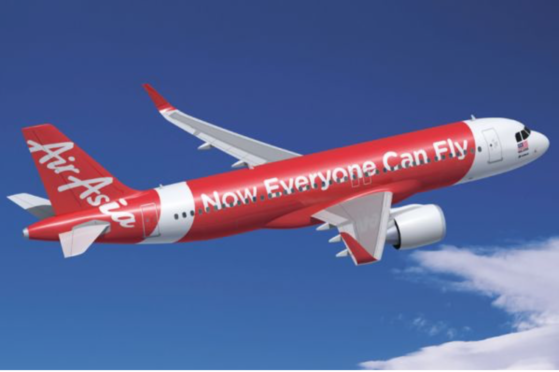
(Air Asia A320neo, © Airbus S.A.S.)
AirAsia uses “Now everyone can fly“ as their slogan. “Now everyone can think“ would be a lot more sustainable.
Here’s a little food for thought:
The tank of a Boeing 747 has a capacity of 200.000 liters of kerosine – fuel equivalent to 4.000 small cars. (Hint: It’s a lot of cars!) Taking off and climbing to altitude requires the most fuel. But planes altogether cause a great mess up in the air. They release carbon dioxide in large quantities, and also nitrogen oxides, ozone, water vapor, soot and sulfurs, which has an additional impact on global warming.1
To give you some concrete numbers: If you fly from Paris to Barcelona (826km), each passenger causes 238 kg of carbon dioxide emissions. If you opt for the train to travel the same distance, the number drastically reduces to 11kg CO2 per passenger, which is less than a twentieth.1
Time and money – those are the two major arguments in favor of flying. Flights are the quickest way to get around. However, when we talk about time, we tend to forget to factor in the hours we actually need to get to the airport, wait at the airport, go through security check and then get from the airport to our final destination. You can easily add 3-4 hours to your flight time to arrive at your actual travel time.
As concerns the monetary aspect, it’s worth giving ticket prices a second thought. Perversely enough, plane tickets are very often cheaper than train tickets. You wonder why? Well, for one thing air traffic is heavily subsidized. As a car driver you pay mineral oil tax every time you fill up the tank, rail services have to pay an energy tax when operating, but planes are exempt from mineral oil tax. They pay zero, nil, nada, niente. This tax exemption amounts to an indirect subsidy of 30 billion € that air traffic receives within the European Union. You wonder how that came about? Well, kerosine has been taxfree since 1944. Back then, the plane was a new means of transport and the tax exemption was like a start-up funding for a new innovation with unclear prospect of success.2 Ok, almost a century (!!!) later it’s pretty damn clear where we are heading…
Since 1990, CO2 emissions caused by air traffic have more than doubled within the European Union, namely from 80 Mio. tons (1990) to more than 160 Mio. tons (2019). It’s just an abstract number, but it becomes truly alarming, when you put it in perspective: Austria as a country emits about 82 Mio. tons of CO2 per year in total – energy, industry and agriculture together. EU air traffic emits twice as much.2 Pretty crazy, huh?
We like to fly around, and the cheaper, the better. Low-cost carriers are the cash cows of the hour. Within the last year Ryan Air carried more than 140 million passengers.5
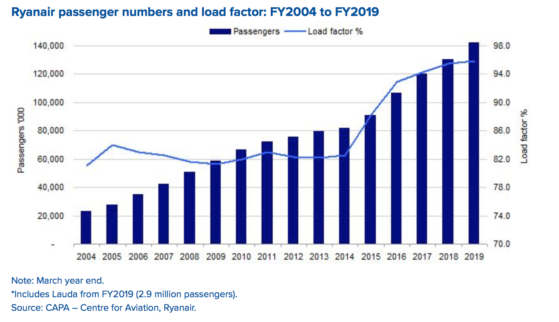
140 million – that’s about the total population of Germany, Austria and England together. Oh and – that’s Ryan Air alone. You know, there’s a lot more, right? In fact, if you tried to count all the airlines that operate on global skies, you would probably do nothing else for three days. And in case you’re an accomplished bargain hunter of cheap flights – next time you are about to book a plane ticket that’s less than your Netflix subscription, think about the other end of the equation – key words: “precarious working conditions“2 and “hidden social and environmental cost“.
Because the sad truth is: Air traffic does not pay for the damage it inflicts on the planet and its inhabitants, i.e.: us. It is us who have to pay for that shit. And with us I not only mean the “frequent travelers“, but also those, who have never seen a plane from the inside. In Austria, that’s about 1/3 of the population2, globally speaking, it’s about 72%6. If you think that is unfair, your common sense and good judgment are still in place. To put it differently, the behavior of a minority of people causes damage that affects the majority of people. But which damage are we actually talking about?
Well, the social cost of carbon includes noise-induced health costs as well as significant environmental costs. Climate change, which as we all know is brought about by greenhouse gases, is literally a hot topic and it affects us all. Based on research by Ireleand’s Economic and Social Research Institute, the social cost of carbon may amount to $489€ per ton of CO2.1 This cost needs to be added on top of the regular ticket price to offset the share of climate change we induce. As you see from the graphics below, the “cheap flights“ are suddenly not as cheap anymore:
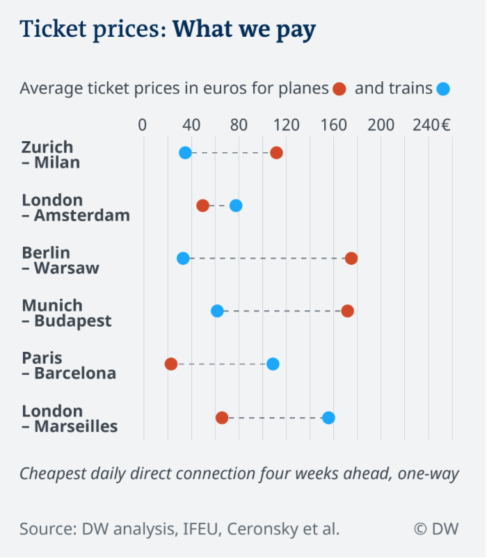
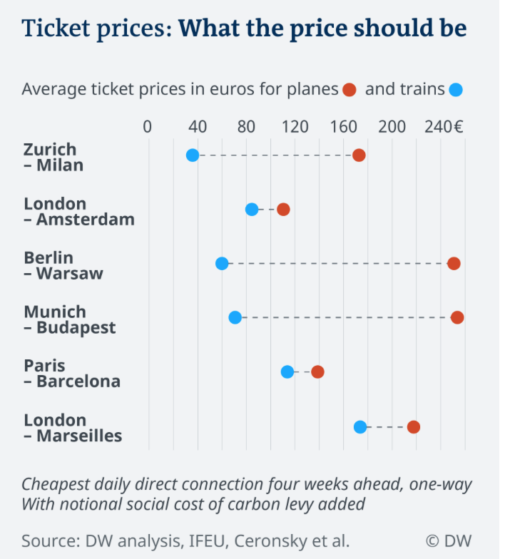
So what can you, as an environmentally aware person do?
Step 1: Avoid flying. In our instant-gratification-ridden world, “sacrifice“ is something we avoid at all cost. Sacrifice is uncomfortable and requires self control. Why should we wait for something (and delay gratification) when we can have it right away? Why shall we be happy with 1 [blank], when we can 5,10, 50,… [blank]? Tinder, Amazon Prime, Netflix, Instagram, budget airlines – they all take the same line: They all serve us in our quest for the cheap thrill, the quick fix, the fast fun, instant gratification. Next time you go on checkfelix.com, doublecheck if your plane trip is actually worthwhile:
- Have you got enough time to really explore the place you go to?
- How many flights have you already taken this year?
- Is flying the only option or is there a more sustainable way to get to your destination?
As I mentioned before, I believe that going on fewer (plane) trips and rather spending more time in the country of choice is not only the more sustainable option, it’s also the more rewarding one. Because, I mean, what do you really understand about a country when rushing through it as if chased by the coolness police? Can you really say you’ve “seen a country” when all you’ve really seen is the church tower, a Mc Donald’s and three bars? I doubt it.
Step 2: Use the train. Train traffic is much more energy-efficient than air traffic, and traveling by train is the far more environmentally friendly option:
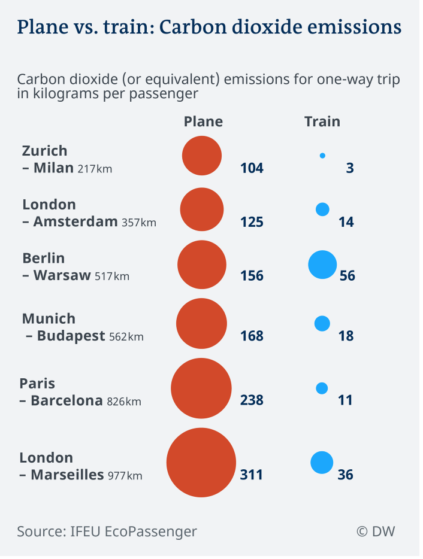
As you can see, changing the plane for the train whenever possible goes a long way. The Swedish environmental activist Greta Thunberg, for instance, took the train to go from Stockholm to visit the World Economic Forum in Davos earlier this year, which was a journey of about 65 hours (round trip).3 Now I understand, 65 hours on the train is a bit heavy – if you’re like me, a 6-hour-trip feels long already (no matter the means of transportation). But I guess combating climate change is not about feeling comfortable all the time and necessitates renegotiating what is subjectively acceptable. Overnight trains might be a good solution when traveling longer distances.
But there is no doubt that train traffic needs to undergo considerable innovation and restructuring in order to be a legit alternative to air traffic. High-speed trains, a better infrastructure, more price-effectiveness and a feasible and customer-friendly booking procedure with regard to transnational train routes must be put in place to make rail travel attractive for the wide public. What currently hinders innovations in that sector is nationalism and a small-state mentality. What is needed is a European approach – one, in which all rail routes across Europe are treated as “domestic“ ones.2 Which brings me to the next point….
Step 3: Vote for the green-minded party. Nationalism is going strong all across Europe, and it doesn’t get us anywhere (literally so, if you think about the rail network…). In order to really change things for the better, we need a united Europe – one that fervently tackles topics like sustainability and future-oriented mobility. As Christian Gratzer from the VCÖ (Austrian Traffic Club) points out, politics means steering things, not only letting them happen.2 An effective and efficient railway network all across Europe should be an urgent point on the political agenda. Another one should be to stop subsidizing air traffic. Make airlines pay mineral oil tax, for fuck’s sake! As long as plane tickets are cheap as dirt, more and more people will unscrupulously fly around. (#instantgratification #hedonisticpleasurehunt #idc)
Economic growth must not be the only parameter when making political decisions. Climate change and people’s health gotta be factored in. Think about the controversial construction of the third airstrip on the Vienna International Airport: The 3680m long runway will be built despite the resistance of several public campaigns and environmental organizations. Its construction, which the lawyer Wolfram Proksch termed “Austria’s most climate-damaging project“7, will necessitate relocating the federal highway B107 and will swallow up funds into the billions.8 The adjoining municipalities, which are heavily affected by aircraft noise and whose residents had complained against the constructional measure, were compensated (can we say silenced?) by the Airport with millions of €.9 According to Christian Gratzer, the expansion of the airport is a waste of money and an investment that’s geared to the past and not to the future.2 Even Austrian Airlines Manager Walter Reimann states that from Austrian Airline’s perspective, the third runway is currently not necessary. He adds that in the medium and long run, Austria will have to consider whether we want Vienna to become a hub airport or not.2 When you think of global aviation hubs like the new mega-Istanbul Airport, which has a full capacity of 200 million passengers annually, or the Dubai International Airport with 7 runways, I think the answer should be pretty clear… Short-sighted, power-hungry, lobby-sponsored politicians like to argue in terms of economic growth and job creation. It’s just easier to quantify than sustainability… Besides, as Christian Gratzer points out, investments in more sustainable behaviors and technologies also create jobs.2 In that sense, system change, not climate change should be the general motto.10
Finally, I really believe it’s important to spread the word and raise awareness in this matter. Before I started my research, I was not aware of even half of these facts. The thing is – if you fly, it completely messes up your carbon footprint and your being vegan or avoiding plastic cups is worth a penny.
Don’t get me wrong, traveling is a great thing. It, no doubt, is a lot of fun, can broaden your horizon and can present an enriching experience. However, when making our choices, we have to consider that we are not the last generation to live on that planet.
A couple of years ago, a friend of mine built his own raft, which he used to go from Vienna to Turkey. Adventure – check, sustainability – check, story – 100. Maybe this little anecdote inspires you.
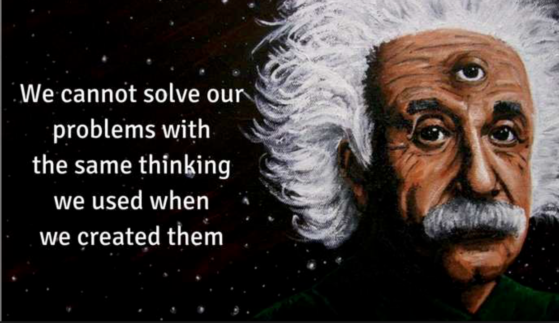
———————————————————-
Sources:
1https://www.dw.com/en/trains-vs-planes-whats-the-real-cost-of-travel/a-45209552
2https://www.falter.at/falter/radio/061019c542954228b49b9ad656e159fd/darf-ich-noch-fliegen-179
4 https://futter.kleinezeitung.at/fridays-for-future-greta-thunberg-kommt-nach-wien/
6https://www.dw.com/en/could-eco-friendly-flying-be-on-the-horizon/a-46403432
7https://diepresse.com/home/wirtschaft/economist/5597602/Dritte-Piste-am-Flughafen-Wien-darf-gebaut-werden
8http://www.austrianaviation.net/detail/rcb-schaetzt-kosten-fuer-3-piste-auf-11-mrd-euro/
10https://systemchange-not-climatechange.at/de/auswirkungen-3-piste/
————————————————————————————–
I want to thank my sister for her great input and ideas on that topic. She’s one of the most sustainable people I know and always a great inspiration. Thank you, Magdi!


